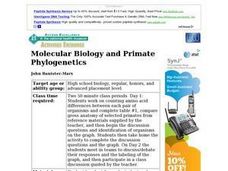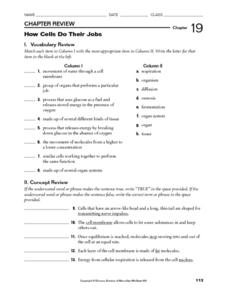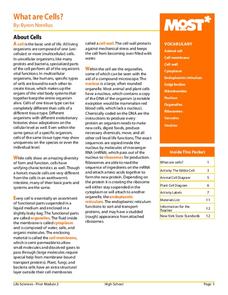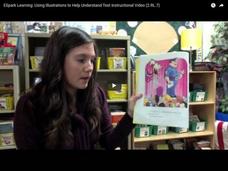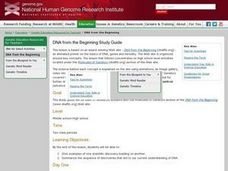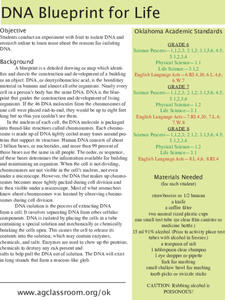Curated OER
Molecular Modeling Activity
High schoolers explore the concept of molecular modeling and differentiate between saturated and unsaturated compounds. In small groups, they identify molecular formulas, complete a chart comparing alkanes, alkenes, and alkynes, and...
Curated OER
Sweet Science: How Sugar Molecules are Manipulated in Candy Making
Students investigate how heat affect sugar solutions. In this science lesson, students compare the sweetness of different types of sugars. They research the development of sugar and create a timeline.
Curated OER
Controlling the Code: Molecules at Word
Learners investigate how cells determine which genes will be expressed and which will be silent. In this genetics lesson, students use on-line resources to complete a worksheet and gather information about gene regulation. Lesson...
Curated OER
Life on the Ocean Floor
Why would water 2700 meters deep suddenly become warmer? Explore this and other ocean floor discoveries through this reading response worksheet. Scholars read information about the organisms discovered by Alvin, a deep-sea submersible....
Curated OER
Constructing a Phylogenetic Tree
Students are given the opportunity to analyze DNA sequence differences between organisms in order to establish a reasonable picture of the evolutionary relationships between them (Phylogenetic Tree). In the simulation form they are...
Curated OER
Homologous Shoes
Students examine the concept of homology by observing their shoes and those of their classmates. They summarize the observations of everyone's shoes relating it to chromosomes in cells. They share their observations with the class.
Curated OER
The Marvels of Mud
Young scientists roll up their sleeves and get a little dirty in this three-day earth science investigation. Following the scientific method, children monitor the growth of algae in pond water samples in order to determine the role that...
Curated OER
Molecular Biology and Primate Phylogenics
By counting differences in amino acids, biology stars examine the relationships between different primates. With information gleaned, they map out a phylogenic tree and discover common ancestry. You will need to create printable versions...
Curated OER
Nuclear Magnetic Resonance
Eleven slides are used in this PowerPoint to present how nuclear magnetic resonance works and to give learners an opportunity to interpret examples of nuclear magnetic resonance spectra. Ample information is provided, so this is a...
Curated OER
Go To The Head of the Cloud
Students pretend they are water droplets traveling through the water cycle. Using their text, they discover the steps in the cycle and the different paths water can take. They write a report about their journey through the water cycle...
Curated OER
How Cells Do Their Jobs
In this cells worksheet, students will review cell characteristics and structure and different types of cells and what role they play in the body. Students will investigate experimental results of the influence of sucrose on the...
Curated OER
Life Substance
In this life substances worksheet, high schoolers will review carbon atoms, monosaccharides, dissaccharides, polysaccharides, lipids, proteins, and nucleic acids. This worksheet has 4 true or false and 17 matching questions.
Curated OER
Hierarchical Organization in Biology: Students Presentations of Neurobiology
Students gather (research) information on neuron structure and action potential. Students are guided to make inferences about the synapse and its relationship to neurotransmitter release and action. They are also guided to make...
Curated OER
What Are Cells?
Energize the cells of young biologists with an edible life science activity. Engaging learners in exploring the inner workings of plant and animal cells, this activity involves using colored jello and various sweet and tasty treats to...
Museum of Science
goREACT
Beginning Boyles and curious Curies can safely experiment with the virtual mixing of elements using this entertaining application.
Curated OER
DNA from the Beginning Study Guide
Students complete a study guide using a website which is an animated primer on DNA, genes, and heredity. The Web site is organized around key concepts. The web links and study guide are included.
Curated OER
Inheritance Patterns in Zorks
In this inheritance patterns worksheet, students create a visual of a Zork using chromosome strips to represent alleles from the father and the mother to determine the traits in the offspring. Students translate the genotype to the...
Curated OER
Winter
High schoolers explore the nature of water and water molecules. They examine the role of ice on organisms.
Curated OER
What's Matter?
Young scholars explore many of the basic properties of matter including atoms, ions, elements, molecules, and density. The class explores an interactive flash-animated Web site to answer questions and clarify misconceptions they might...
Curated OER
DNA Blueprint for Life
Did you know that meat tenderizers contain DNA cutting enzimes? Did you know that you can isolate your own DNA? Or the DNA of fruit? Explore with your learners the DNA world with a series of experiments using readily available materials...
Curated OER
Animals of the Fire Ice
Students examine ocean life by identifying methane hydrates. In this ocean life lesson, students research organisms that live in the coldest, deepest parts of the ocean and live off methane hydrates. Students create a group...
Curated OER
Yeast Bread: Final Evaluation Project
Identify and prepare yeast breads. National Standard 14.3.3 Identify the classes of breads: rolls, loaves, deep-fat fried Identify ingredients in yeast breads and their functions: flour, yeast, liquid, salt, sugar, fat and eggs Identify...
Curated OER
Nucleic Acids and Protein Synthesis
Tenth graders complete a vocabulary assignment based on terms in the unit. They complete appropriate worksheets as each section of the unit is completed. They participate in classroom discussions. They construct a model of a DNA molecule.
Curated OER
Design a Deep- Sea Vertebrate or Invertebrate
Students design a deep-sea animal. For this research based lesson, students research and design a vertebrate or invertebrate that lives in a methane hydrate habitat. They compile a class chart of the adaptations animals have in this...









